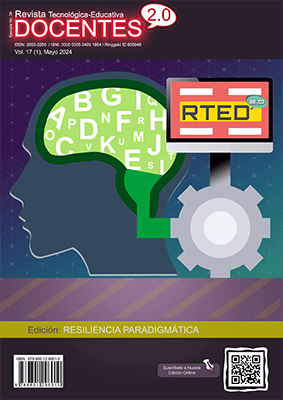Educate and Practice Digital Ethics
 DOI:
https://doi.org/10.37843/rted.v17i1.435
DOI:
https://doi.org/10.37843/rted.v17i1.435
Main Article Content
Abstract
Incorporating new educational methodologies has led to new challenges for schools related to the need for appropriate use of technology. The objective of this study was to analyze the use of digital technology by 6th EP and 1st ESO teachers and how they see their students using it. The inductive method was used, with a quantitative approach, experimental, descriptive, and cross-sectional design. The information collection procedure consisted of questionnaires sent to teachers of 6th EP and 1st ESO in the 2019-2020 academic year in a public institute in Castilla la Mancha (Spain). The sample corresponds to two centers attended by students from different city areas. The study analyzed the use of devices by teachers who teach in 6th EP and 1st ESO and how they perceived their students using the network. It was concluded that teachers' safe use of the network is essential for protecting the privacy and security of students. The questionnaire was previously subjected to expert judgment. Teachers need training and information to educate their students safely and responsibly using the network and integrating digital tools and resources safely and responsibly in teaching-learning.
Downloads
Metrics
Article Details

This work is licensed under a Creative Commons Attribution-NonCommercial-NoDerivatives 4.0 International License.
Those authors who have publications in our journal accept the following terms:
- When a work is accepted for publication, the author retains rights of reproduction, distribution of his/her article for exploitation in all countries of the world in the format provided by our magazine and any other magnetic medium, optical, and digital.
- Authors will retain their copyright and guarantee the journal the right first to publish their work, which will be simultaneously subject to the Creative Commons Acknowledgment License (Attribution-NonCommercial-NoDerivatives 4.0 International (CC BY-NC-ND 4.0)). That allows third parties to copy and redistribute the material in any medium or format, under the following conditions: Acknowledgment - You must properly acknowledge authorship, provide a link to the license, and indicate if any changes have been made. You may do so in any reasonable way, but not in a way that suggests you have the licensor's endorsement or receive it for your use. NonCommercial - You may not use the material for a commercial purpose. NoDerivatives - If you remix, transform, or build from the material, you cannot broadcast the modified material. There are no additional restrictions - You cannot apply legal terms or technological measures that legally restrict you from doing what the license allows.
- Authors may adopt other non-exclusive license agreements to distribute the published version of the work (e.g., deposit it in an institutional archive or publish it in a monographic volume) provided that the initial publication in this journal is indicated.
- Authors are allowed and recommended to disseminate their work through the Internet (e.g., in institutional telematic archives, repositories, libraries, or their website), producing exciting exchanges and increasing the published work's citations.
- Request of withdrawal an article has to be done in writing by the author to the Editor, becoming effective after a written response from the Editor. For this purpose, the author or authors will send correspondence via e-mail: [email protected].
- The author will not receive financial compensation for the publication of his work.
- All Docentes 2.0 Journal publications are under the Open Journal System (OJS) platform at: https://ojs.docentes20.com/.
References
Blais, J. J., Craig, W. M., Pepler, D., & Connolly, J. (2008). Adolescents online: the importance of Internet activity choices to salient relationships. Journal of Youth and Adolescence, 37,522–536. http://dx.doi.org/10.1007/s10964-007-9262-7 DOI: https://doi.org/10.1007/s10964-007-9262-7
Bueno de Mata, F. (2012), Fodertics estudios sobre Derecho y Nuevas Tecnologías. Andavira Editora.
Caballero-Gea, J. A. (2007). Derecho al honor, a la intimidad personal y familiar y a la propia imagen, derecho de rectificación, calumnia e injuria. Dykinson.
Dulac, J. (Coord) (2020). Pluma y Arroba. Soluciones educativas al COVID-19. pp. 269-285. Editorial Aula Magna. Mc Graw Hill interamericana de España S.L.
Giones-Valls, A., & Serrat-Brusteng, M. (2010) La gestión de la identidad digital: una nueva habilidad informacional y digital en: Bid. Textos universitarios de biblioteconomía y documentación. http://eduteka.icesi.edu.co/gp/upload/giones2.pdf
Granizo-Garrido, R. (2021). Protección y Seguridad en tiempos COVID. En: Dulac, José (Coord) (2021). Pluma y Arroba. Soluciones educativas al problema COVID-19. Prospectiva. pp. 251-274. Editorial universitaria Aula Magna Mc Graw Hill
Griffiths, M. (2000a). Does Internet and computer “addiction” exist? Some case study evidence. CyberPsychology and Behavior, 3, 211-218. DOI: https://doi.org/10.1089/109493100316067
Hernandez-Sampieri, R., Fernandez-Collado, C., Baptista-Lucio, P. (2006). Metodología de la Investigación. (4 ed). McGraw-Hill
Jiménez-Morales, M. (2007) Teleprogramando a consumidores en miniatura. Publicidad para niños que habla el lenguaje de adultos, Quaderns del CAC, nº 27, 2007, pp. 125-136.
OCDE (2016). Panorama de la educación. Indicadores de la OCDE 2016. Madrid: Instituto de evaluación educativa. Ministerio de Educación, Cultura y Deporte. https://n9.cl/etuv7
Sacristán, A. (Coordinadora) (2018). Sociedad Digital, Tecnología y Educación. UNED.
Soledad-González, C. (2004). Sistemas inteligentes en la educación: una revisión de las líneas de investigación y aplicaciones actuales. RELIEVE: 10(1), pp. 3-22. https://n9.cl/vf2n6
Tamayo y Tamayo, M. (2007). El proceso de la investigacion científica; incluye glosario y manual de evaluación de proyectos (4a. Ed.). Limusa.
Wainer, J., Dwyer, T., Silveira, R., Covic, A., Magalhães, V. B., Ferreiro, R. L., & Claudio, K. (2008). Too much computer and Internet use is bad for your grades, especially if you are young and poor: results from the 2001 Brazilian SAEB. Computers and Education; 51, 1417-1429. http://dx.doi.org/10.1016/j.compedu.2007.12.007 DOI: https://doi.org/10.1016/j.compedu.2007.12.007






